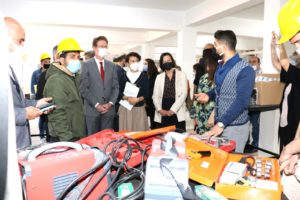
Technical Assistance for Implementation of Civil Society Dialogue and Civil Society Support Programmes (TR2015/DG/01/A5-01/001)
The overall aim of the project is to increase bilateral exchanges and cooperation between CSOs in Turkey and the EU at local, regional and national levels, to promote awareness raising initiatives on importance and benefits of membership of Turkey to the EU within Turkey and EU and on

Technical Assistance on Mental Health Care and Drug Addiction Treatment Services in Prisons
Mental health and drug addiction are challenges for penitentiary systems all over the world. The purpose of this project was to tackle these issues in Turkish prisons and to bring the country’s penal services into line with international and European standards.

Technical Assistance to Support the Reform on Employment Policies and Vocational Education and Training
This project aims to contribute to implementing the 2019 – 2022 National Employment and Skills Strategy (NESS) action plan of Albania. The implementation of this action plan will help strengthen the capacities of Albania’s Ministry of Finance and Economy and its subordinated institution (National Agency for Employment and

Support to the Development of the Penitentiary and Probation Systems in Georgia
Countries are looking for an effective and fair way to penalize criminals and prevent recidivism significantly. Within this scope, the overall aim was to reduce recidivism in Georgia and to develop modern and efficient criminal and probation systems to ensure public safety that protects the human rights of

Technical Assistance for Promoting Youth Employment in TRC3 Region
The purpose of the contract is to increase the vocational skills of young people in TRC3 Region and promote their integration into the labour market through conducting vocational and entrepreneurship training, guidance and counselling services. Also, it applies a holistic approach to increase the capacity of multiple stakeholders

Technical Assistance for Promoting Registered Employment
Unregistered employment remains one of the critical concerns and significant challenges of the Turkish labour market. Even though recent years have seen a downward trend in unregistered employment, a substantial portion of Turkey’s workforce is still employed without being registered with the social security system. In this regard,

